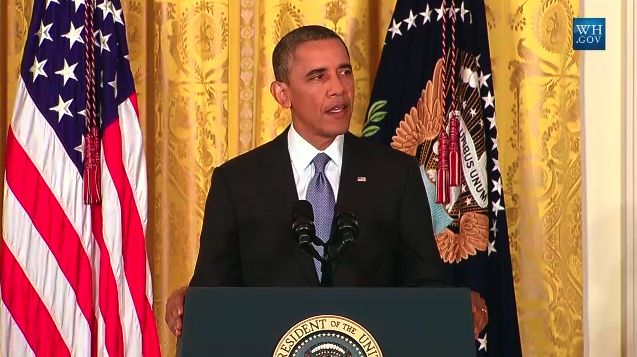Obama orders reforms to NSA phone data collection, end to spying on foreign friends
Will changes silence harshest critics?

Sign up for breaking news, reviews, opinion, top tech deals, and more.
You are now subscribed
Your newsletter sign-up was successful
President Barack Obama has called for an overhaul to how the US National Security Agency collects and uses citizens' phone records and an end to eavesdropping on foreign heads of state.
In the second speech addressing the controversial NSA policies that have come to light from documents in the hands of Edward Snowden, Obama said Friday that he's "ordering a transition," one that will end "[the] bulk metadata program as it currently exists and establish a mechanism that preserves the capabilities we need without the government holding this bulk metadata."
He maintained that the NSA's data collection program is an important tool in identifying and preventing terrorist threats.
While he hasn't seen any cases of abuse in the agency's phone collection activities, Obama said he recognizes the potential is there for it to occur.
So what will change?
Obama has asked US Attorney General Eric Holder and intelligence officials to hand in a plan by March 28 that outlines how phone record data will transition from the government to a third-party agency.
Who that third-party record keeper will be has not yet been determined.
Starting now, the government will only investigate phone calls "that are two steps removed from a number associated with a terrorist organization instead of the three," the president said.
Sign up for breaking news, reviews, opinion, top tech deals, and more.
The president is also requiring that the NSA obtain a court order before it can access phone records.
The president plans to consult Congress on appropriate boundaries for phone records collection, and has tasked the legislative branch with forming a panel of public advocates to represent privacy interests to the FISC.
Generally, Obama's reforms may take months if not longer to implement, and many of the NSA surveillance practices that came to light after the Snowden leaks remain untouched.
Though Holder will look into reforming national security letters (a government subpoena seeking records for national security reasons) to lift the indefinite gag orders accompanying them, Obama won't require that a court order is needed to obtain them.
Looking off shore
Obama also ordered a cease to the eavesdropping on foreign leaders and governments considered friends or allies. In October 2013, German Chancellor Angela Merkel called Obama after information arose the US had tapped her private mobile phone.
Pending a significant national security reason, the US "will not monitor the communications of heads of state and government of our close friends and allies," the president said.
The president's speech comes after months of revelations of how the NSA collects and keeps information, raising alarms from those within the US government, global governments, private citizens, the tech community and privacy advocates.
On January 16, new claims arose that the agency indiscriminately gathers up to 200,000,000 text messages daily. The UK's GCHQ reportedly has access to the texts.

Michelle was previously a news editor at TechRadar, leading consumer tech news and reviews. Michelle is now a Content Strategist at Facebook. A versatile, highly effective content writer and skilled editor with a keen eye for detail, Michelle is a collaborative problem solver and covered everything from smartwatches and microprocessors to VR and self-driving cars.